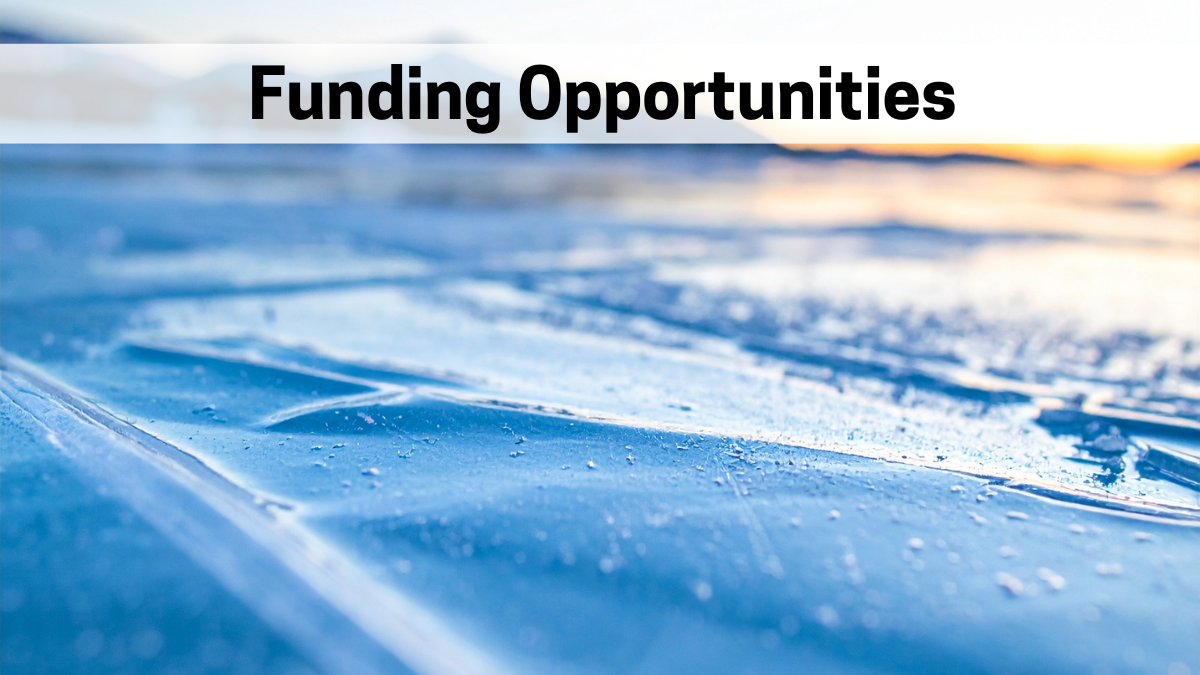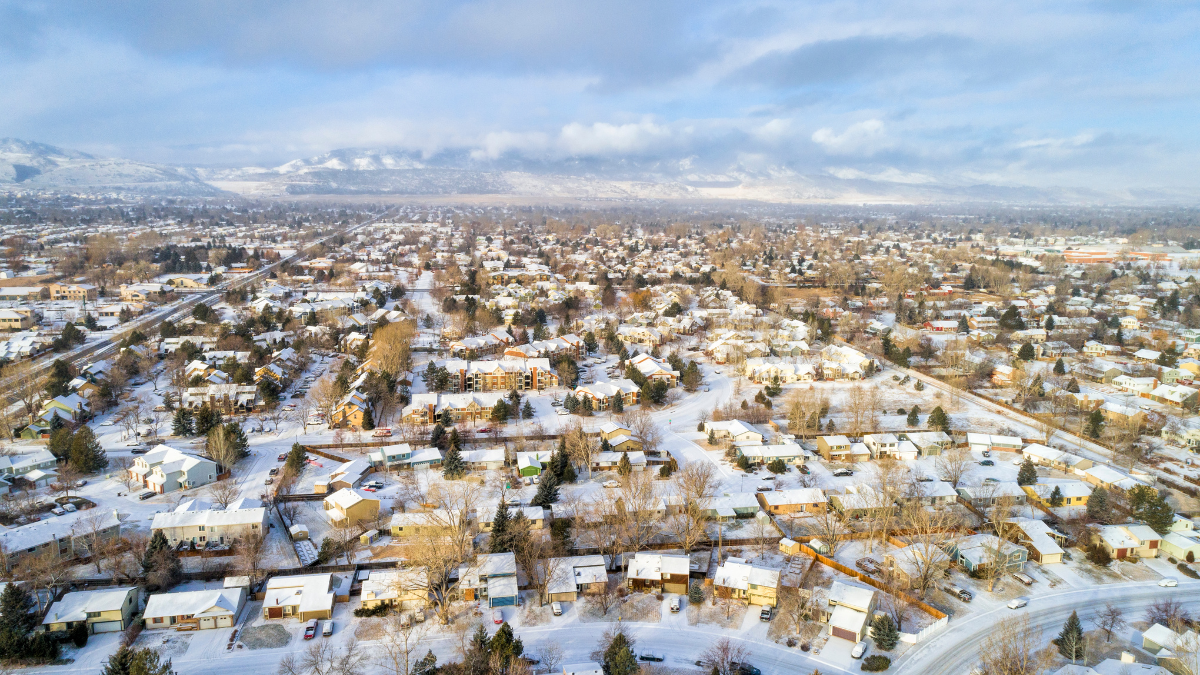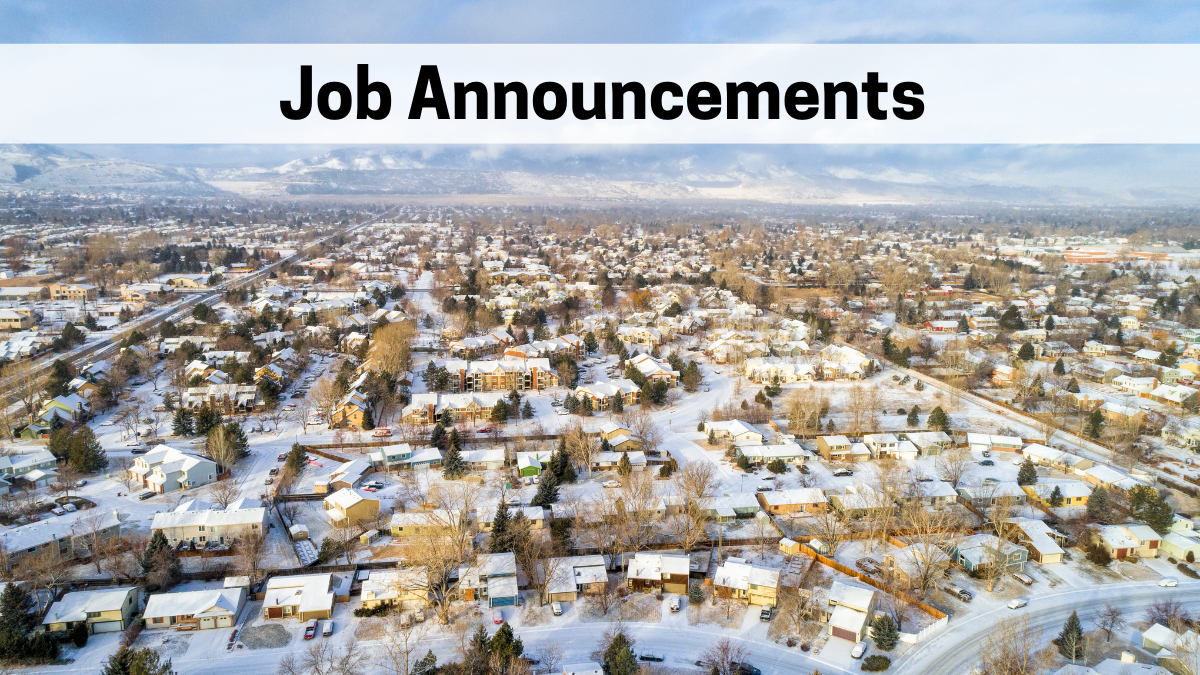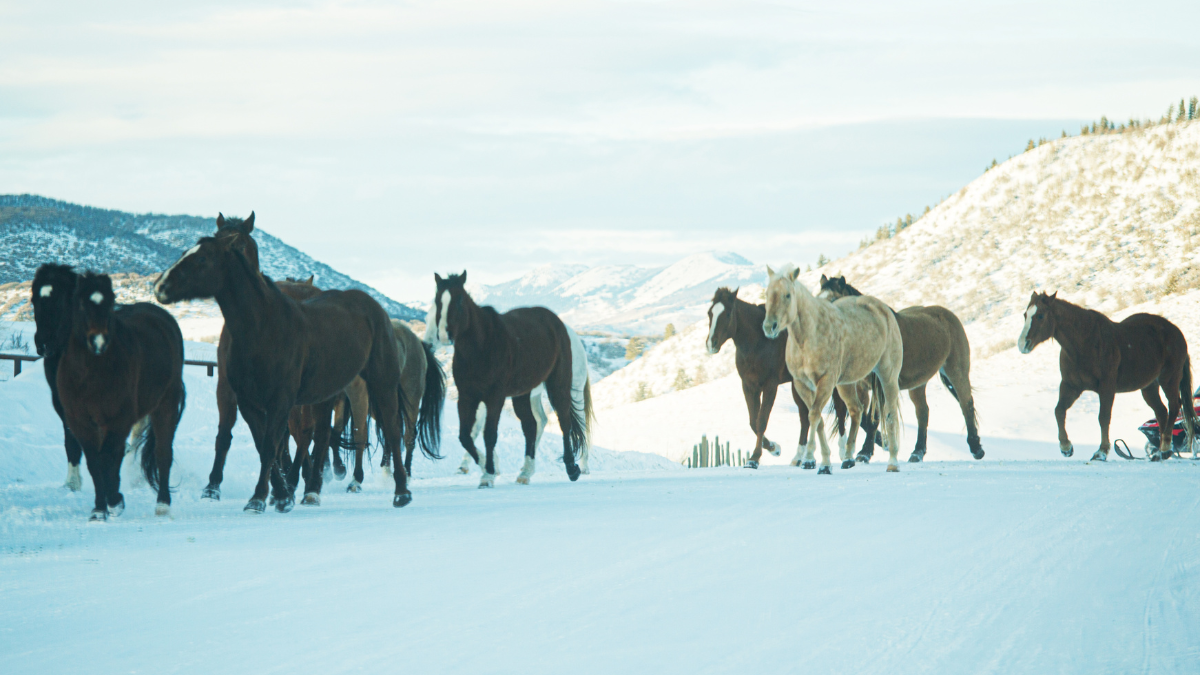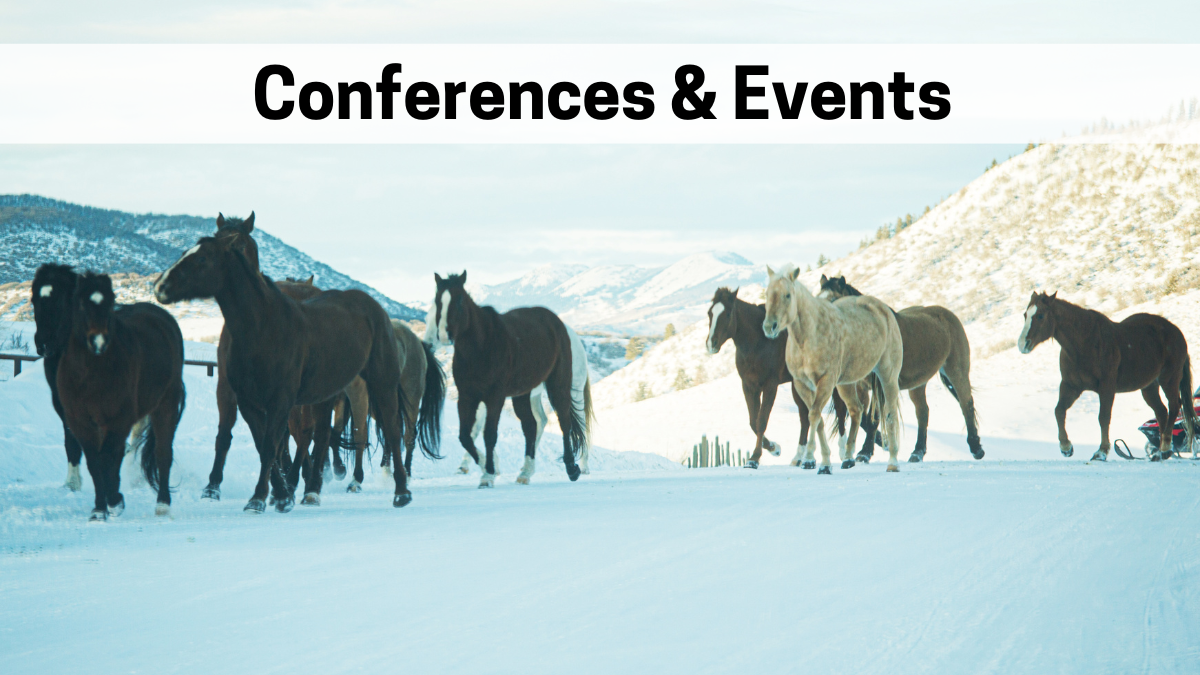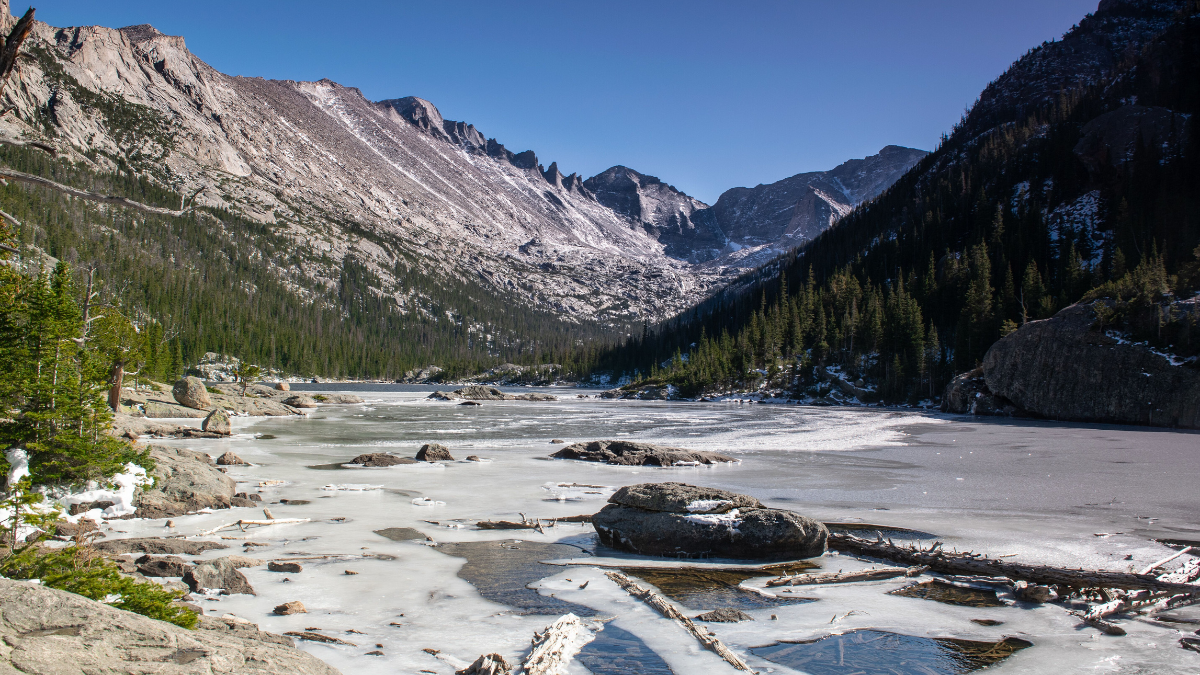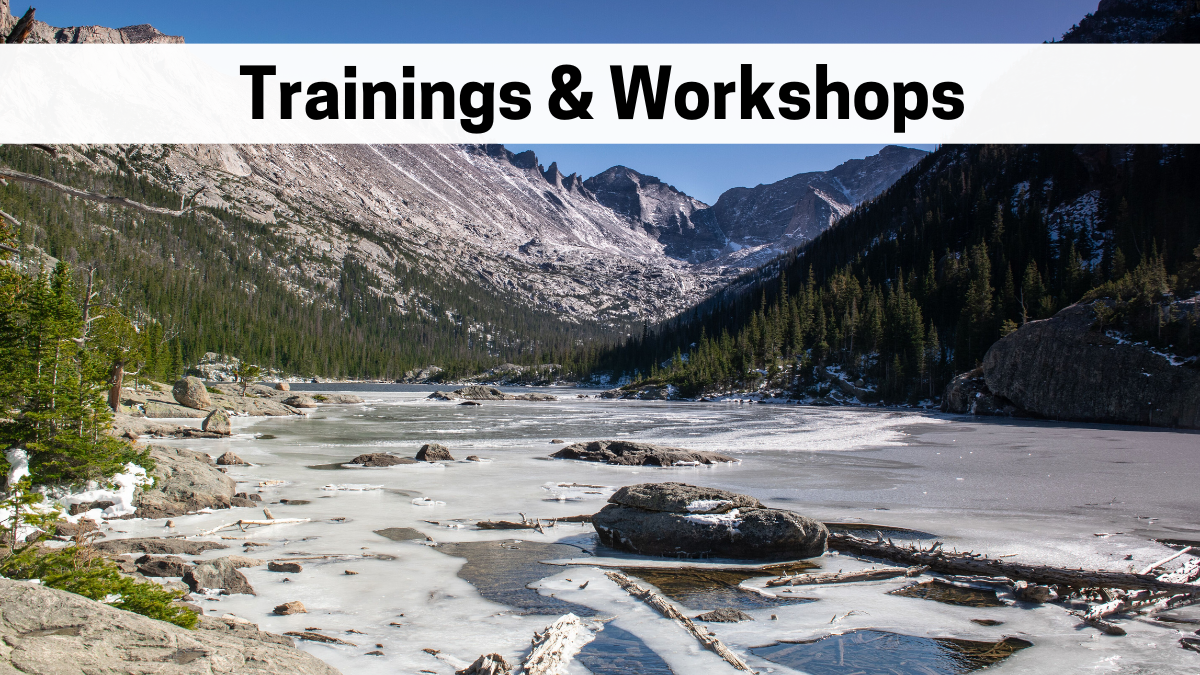
Funding Opportunities Late February
Grant Deadlines:
| 2026 Water Education Grant | The Gunnison River Basin Roundtable is pleased to announce grants of up to $1,500 for water education through its Public Education, Participation, and Outreach (PEPO) Committee. Funds are available to anyone engaged in water education for children up to 18 years old in the Gunnison Basin. | Deadline: February 23, 2026 at 5:00 p.m. |
|---|---|---|
| Wetlands for Wildlife Grants | The Colorado Wetlands for Wildlife Program is a voluntary, collaborative, and incentive-based program to restore, enhance, and create wetlands and riparian areas in Colorado. Colorado Parks and Wildlife annually seeks applications for wetland and riparian restoration, enhancement, and creation projects to support the goals of this program. Learn more HERE. | Deadline: February 24th, 2026 |
| 2026 Diane Hoppe Scholarship | The 2026 Diane Hoppe Scholarship opened for applications on December 15. The $2000 award is a one-year scholarship for a Colorado high school student or college freshman passionate about western water issues. | Deadline: February 27th, 2026 |
| Eagle River Fund | The Eagle River Fund, managed by the Western Colorado Community Foundation, will be launching its inaugural round of grantmaking in February. The Eagle River Fund provides match funding to help organizations leverage additional support for impactful local projects. Eligible applicants include 501(c)(3) nonprofits, public entities such as municipalities and special districts, and private organizations working in partnership with an eligible fiscal sponsor. Projects must address one or more of the Fund’s key objectives: * Water Quantity: Efforts to improve water efficiency, conservation, and functional streamflows. * Water Quality: Strategies that reduce erosion, stormwater impacts, or maintain natural temperature regimes. * Natural Infrastructure: Restoration and habitat projects that improve streamside and instream conditions and support ecological resilience. For the 2026 competitive funding round, the expected range for grant funding is from $5,000 to $25,000. Projects should be designed for completion within 12–18 months. Before submitting an application, interested organizations are encouraged to contact Melanie Smith at smith@eagleriverco.org to discuss project ideas and eligibility. Questions about the online application system may be directed to Sarah Fuller, Program Officer at WCCF (sfuller@wc-cf.org), or Talitha Costello, Database and Records Associate (tcostello@wc-cf.org). The deadline to apply is Friday, February 27, 2026, by 5:00 p.m. MST. Learn more HERE. |
Deadline: Friday, February 27, 2026, by 5:00 p.m. MST. |
| Colorado Healthy Rivers Fund | A grant application may be submitted for locally-based watershed protection efforts. Applicants must be committed to a collaborative approach for the restoration and protection of lands and natural resources within Colorado’s watersheds that complement sustainable economic development. Two categories of grants will be available under the Colorado Healthy Rivers Fund program: (1) Project Grants, and (2) Planning Grants. | Deadline: February 28th, 2026 at 5pm MST |
| Metro Roundtable WSRF Proposal Summaries | The Metro Roundtable is seeking proposals for their Water Supply Reserve Fund Basin Grants. The Water Supply Reserve Fund is designed to provide grants to assist in addressing critical water supply issues and interests. The Roundtables play a major role in allocating these state funds for water projects in the South Platte basin and Denver Metro area. | Deadline: March 1st, 2026 at 5pm MST |
| Grand County Open Lands, Rivers, and Trails Fund | The Open Lands, Rivers, and Trails (OLRT) Fund supports fee simple and water rights acquisitions, water quality and river restoration projects, operational costs for approved nonprofits, and certain trail and wildfire mitigation efforts, with no more than 40% of funds (after administrative expenses) used for trail creation/maintenance and wildfire prevention. | Deadline: March 13th, 2026 |
| PFAS Grant program | This Request for Applications (RFA) sets out the policies and procedures for implementation for the Per- and polyfluoroalkyl substances (PFAS) Grant Program created through SB 20-218. The purpose of the PFAS Grant Program (Program) is to provide financial assistance to minimize risk to the public from certain hazardous substances (ex: PFAS) in drinking water. The Program provides funding to support efforts in identifying, assessing, and reducing environmental impacts of PFAS on human health and the environment. | Deadline: March 13th, 2026 |
| Yampa River Fund | The Yampa River Fund is excited to announce the availability of $267,022 for grants in 2026. Applications will be accepted from Feb. 17 to April 1. Projects that are prioritized for funding will: Enhance water security for communities, agriculture, the economy and the natural environment in the Yampa Valley.Support a healthy, flowing river and enhance critical low flows through water leases from reservoirs. Maintain or improve river function through a holistic approach to restoration of riparian and/or in-channel habitat. | Deadline: April 1st, 2026 |
Grant Programs:
The Rio Grande Aquatic Navigator Network is a collaborative technical assistance and information network supporting organizations working on aquatic restoration, watershed resilience, and climate adaptation across the Upper Rio Grande watershed. The Network helps partners navigate a rapidly changing funding and policy landscape by providing timely updates, connecting practitioners with funding opportunities and technical support, and offering direct assistance to advance on-the-ground projects. Participants are invited to join the Network’s monthly newsletter and briefing calls to stay informed and connected. Visit https://riograndenavigator.com/ to explore the Network’s centralized funding database, learn more about available resources, and submit a request for free assistance tailored to your project or organization. Please contact emile@bestrategicbynature.com to learn more and sign up for newsletters and briefings.
The Colorado Water Conservation Board (CWCB) Water Project Loan Program provides low-interest loans for the design and construction of agricultural and municipal water collection, storage, and delivery facilities, as well as hydroelectric power generation projects in Colorado; however, it does not fund drinking water or wastewater treatment projects. A minimum loan request of $100,000 is recommended. Projects financed by the Water Project Loan Program must align with the goals identified in Colorado’s Water Plan and its measurable objectives.
Community Navigator Program - The Watershed Center and Coalitions and Collaboratives, along with several other national and regional nonprofit organizations, are partnering with the US Forest Service on a community navigator initiative, which supports communities in accessing federal funding opportunities, creating partnerships, and building capacity for wildfire risk mitigation and climate resilience. To get in touch with a navigator, fill out a request form here.
Closing America’s Wastewater Access Gap: EPA is offering free technical assistance for communities with failing decentralized (septic) wastewater systems, or communities with no existing wastewater systems at all. Do septic systems back up into homes or cause sewage to pool in yards? Does the town or county struggle to provide adequate sanitation services to its residents? Does the community struggle to rebuild damaged or non-functioning wastewater and septic systems? If any of these conditions apply, then your community may be eligible for assistance through this initiative. Communities – including homeowners and utilities – and all states, Tribes, and territories can request no-cost technical assistance. Technical assistance can help assess current wastewater infrastructure, recommend options, and support development of funding applications for the community. More information can be found HERE.
IRA Forest Landowner Support - Provides grant opportunities to entities and organizations delivering technical and financial assistance to private forest landowners - including Tribes, underserved landowners, and small-acreage landowners - to participate in emerging private markets for forest resilience and climate mitigation.
U.S. Department of Agriculture (USDA) Emergency Community Water Assistance Grants — Rolling application window open — The USDA Emergency Community Water Assistance Grants program supports eligible communities to prepare, or recover from, an emergency that threatens the availability of safe, reliable drinking water. Eligible applicants must show a decline in quantity or quality of water that occurred within two years of the date of the application or that a significant decline in quality or quantity of water is imminent.
FEMA's Hazard Mitigation Assistance grant programs are provided to eligible applicant states/tribes/territories that, in turn, provide sub-grants to local governments. The applicant selects and prioritizes applications developed and submitted to them by local jurisdictions to submit to FEMA for grant funds. Prospective sub-applicants should consult the official designated point of contact for their applicant state/tribe/territory for further information regarding specific program and application requirements.
The Colorado Water Plan Grant Program supports implementation of the Colorado Water Plan.The Partner Actions within the plan offer examples of the types of project level work that CWCB can help support through this grant program. All grant applications will be assessed based on funds available for a particular Water Plan category. Application deadlines are twice per year (July 1 and Dec 1). Colorado Water Plan Grant program multi-benefit funding categories include: Water Storage & Supply; Water Sharing Agreements; Conservation & Land Use Planning; Engagement & Innovation; Agricultural; Watershed Health & Recreation. To learn more or to apply, please contact the CWCB staff person in your basin, listed HERE.
City of Ft. Collins Nature in the City Planning Grants. Have an idea for a nature play area, outdoor gathering space, or pollinator restorations? The Dream it Up Project Planning grants can help you and your community plan out your dream project. Anyone from HOA's, faith-based organizations, affordable housing communities, and even schools are welcome and encouraged to apply. Get started!
Colorado Environmental Justice Grants Program - Community Solutions to Improve Environmental Health. This grant opportunity was created by the Environmental Justice Act to provide funding to communities disproportionately impacted by pollution and climate change. The Environmental Justice Advisory Board oversees the EJ Grants Program and will serve as the selection committee for the grants. You can apply for this grant if you are part of a: non-profit organization, local government, federally-recognized Tribal government, university, other educational institution, for-profit corporation, or grassroots organization.
The Water Supply Reserve Fund (WSRF) Grant Program provides funding to assist Colorado water users in addressing their critical water supply issues and interests through a unique local review process. Requests for funds from the WSRF program must be presented to and recommended by the respective Basin Roundtable prior to submitting a grant application and being considered by the CWCB Board. Deadlines to apply vary based on the respective Basin Roundtable meeting schedule and more information can be found HERE. Eligible projects may include funding for technical assistance regarding permitting, feasibility studies and environmental compliance; studies or analysis of structural, nonstructural, consumptive and nonconsumptive water needs, projects or activities; design of structural projects or activities; infrastructure replacement or maintenance projects.
Natural Resources Conservation Service (NRCS) - Programs include the Environmental Quality Incentives Program (EQIP), Conservation Stewardship Program (CSP), Agricultural Conservation Easement Program (ACEP), Regional Conservation Partnership Program (RCPP), and the Watershed Operations PL-566 Program.
Source Water Assessment and Protection (SWAP) - CDPHE’s SWAP program's main objective is to minimize potential contaminant threats to public drinking water supplies. To engage in this effort, public water systems and governmental entities can apply for a $5,000 protection planning grant through the SWAP program. The SWAP program also supports Wildland Fire Decision Support System work and post-wildfire recovery efforts. SWAP program staff assisted in the development of the Post Fire Playbook to assist local recovery groups in navigating the complexities surrounding post-wildfire recovery. For more information visit the SWAP page.
Water Quality Grants and Loans Unit - CDPHE’s Grants and Loans Unit offers small community grants and water quality improvement fund grants to protect public health and water quality. They also administer the State Revolving Fund (SRF) Loan Program to finance the design and construction of public drinking water and wastewater infrastructure projects. More information on eligible drinking water, wastewater, and stormwater projects is available on the water quality grants and loans page.
The Colorado River District’s Community Funding Partnership was created in 2021 to fund multi-purpose water projects on the Western Slope in five project categories: productive agriculture, infrastructure, healthy rivers, watershed health and water quality, and conservation and efficiency. Funding for the program was approved by Western Colorado voters as part of ballot question 7A in November 2020. These funds provide a catalyst for projects that are priorities for residents in the District to receive matching funds from state, federal and private sources. Click HERE for more information and to apply.
The U.S. Environmental Protection Agency announced the availability of $7.5 billion ofWater Infrastructure Finance and Innovation Act (WIFIA) funding. The WIFIA program offers long-term loans to help communities implement critical water infrastructure projects, which protect public health, deliver environmental benefits, create over 60,000 good-paying jobs, protect waterways including drinking water sources, and support local economies, at a lower cost. The WIFIA program has funding available on an ongoing basis. Learn moreHERE.
Colorado Water Conservation Board has compiled this database to serve as a tool for people and organizations across Colorado to navigate all available funding opportunities for water projects in a single place.
A list of state, federal and private funding available for a wide variety of wildfire mitigation projects including Watershed Health.
Job Announcements Late February
Stream and Lake Protection Program Assistant II - The purpose of the Stream and Lake Protection Section is to advocate the protection, conservation and development of the waters of the state in order to secure the greatest utilization of such waters and the utmost prevention of floods for the benefit and enjoyment of present and future inhabitants of the state. Applications due 2/27/2026. Learn more HERE.
Recreation Ranger with Arkansas Headwaters Recreation Area - Salida, CO - The Watershed Stewards position with the Arkansas Headwaters Recreation Area (AHRA) provides a unique opportunity to engage in watershed education, stewardship, and outdoor recreation management within one of Colorado’s most significant river corridors. Working in partnership with Colorado Parks and Wildlife (CPW), the Bureau of Land Management, and the U.S. Forest Service, the member will play an active role in educating the public about natural resource conservation and resilient recreation, while gaining hands-on experience in river and land management. Submit cover letter and resume to emily@blueelements.org. Please include “Arkansas Headwaters Recreation Area” in the subject line. In your cover letter, explain your relevant experience and your commitment to the mission of the Watershed Stewards program. Learn more HERE.
RESPEC Senior Project Manager - Water Resources - As a Senior Project Manager you will be involved with all forms of planning, design, and specialty services related to the stormwater and water resources engineering field. Projects often involve hydrology, hydraulics, floodplain analyses, detention/water quality BMP design, stream restoration, bridge scour, trail design, stormwater management plans, MS4 compliance, and water rights. The ideal candidate will have project engineering management experience and be eager to mentor and develop junior engineers. Learn more and apply HERE.
The City of Steamboat Springs is seeking to hire a Water Quality & Conservation Specialist. The Water Quality and Conservation Specialist supports and coordinates programs and services to enhance water supply resiliency and watershed health for the City of Steamboat Springs Water and Wastewater Utility through public education and outreach, data analysis and policy development, and long-term planning initiatives. The position serves as the water conservation program coordinator for the joint community-wide plan and program of the City of Steamboat Springs Water Utility and the Mount Werner Water & Sanitation District. Application closes February 27th, 2026. Learn more HERE.
Internships
Conferences & Events Late February
February 23rd, 2026 | Mountain Pine Beetle along the Colorado Front Range - Presenter: Dan West, PhD Entomologist, Colorado State Forest Service Date/Time: Monday Feb. 23, 6-7p Overview: Dr. Dan West will provide an overview of emerging mountain pine beetle activity along Colorado’s Front Range, with an emphasis on current population trends and the conditions contributing to their increase. Zoom Link Monday Feb. 23, 6-7pm.
February 24th, 2026 | WATER CONDITIONS MONITORING COMMITTEE - 9:30 - 11am - The Colorado Water Conservation Board hosts regular meetings to monitor temperature and precipitation outlooks, streamflow, snowpack, reservoir storage, & potential water supply impacts in Colorado. Hear reports from the Colorado Climate Center, National Resource Conservation Service, and updates from local water providers and managers. Learn more HERE.
February 25th, 2026 | MS4 Workgroup Quarterly Meeting - Workgroup meetings will be held virtually and in-person at the Mile High Flood District office. Please contact workgroup chair Candice Owen for more information.
February 25th, 2026 | Ruth Powell Hutchins Water Center 2026 Spring Seminar Series - Colorado Mesa University assistant professor of environmental science and technology, Mark Gilfillan, will give a one-hour seminar about the following topic: US ACE civilian work force missions and STEM opportunities- 4pm-5pm. Learn more HERE.
February 26th, 2026 | St. Vrain and Left Hand Water Conservancy District Annual Water Symposium - The Water Symposium is an opportunity to hear from District staff and other organizations about key issues facing our communities and projects in our basin and statewide. Topics include legislative updates, in stream flow, funding opportunities, and updates on projects. Registration will close on February 20th. Learn more and register HERE.
February 26th, 2026 | Water TAP Open House - Join Colorado State University’s One Water Solutions Institute (OWSI) for an inside look at Water TAP – a unique, real-world testing environment designed to accelerate safe, reliable, and efficient water technologies. Learn more HERE.
February 26th, 2026 | SEDGES & SANDWICHES - 12:00 - 1:00 MST - Join the Society of Wetland Scientists Rocky Mountain Chapter for its February Sedges and Sandwiches with Lindsay Reynolds and Joanna Lemly. This February event is free for all attendees. Speakers: Lindsay Reynolds and Joanna Lemly Topic: BLM Monitoring of Wetlands on Public Lands in the West. Join Zoom HERE.
February 26th, 2026 | Snow Problem: Current State of the Snowpack & What This Means for Our Watershed with San Miguel Watershed Coalition - Join EcoAction Partners, Sheep Mountain Alliance, and the Wilkinson Public Library with special guest from the San Miguel Watershed Coalition for a timely discussion on our current state of the snowpack in our region and across the Mountain West. Engage in a conversation on what we can do to adapt to this reality and how we can prepare for warmer months ahead. As always, coffee, tea and pastries are kindly provided. We hope to see you in the Wilkinson Public Library Magazine room Thursday, February 26th from 8:30-9:30 AM.
February 26th, 2026 | How Water Made the West - Author Talk & Book Signing - Join award-winning author and hydrologist Robert Crifasi for an engaging, story-driven evening exploring the people, politics and power of Western water. Enjoy a lively presentation, audience Q&A, and book signing of Western Water A–Z in the iconic Hotel Colorado, with beverages and appetizers served. Learn more HERE.
February 26th, 2026 | Thinking Like Water Film Screening - The “Thinking Like Water” docuseries follows restoration practitioner Bill Zeedyk and his collaborators as they transform degraded watersheds into more resilient ecosystems – fighting against the ravages of drought and climate change. This in-person screening of the first episode of the series will be followed by a panel featuring local restoration experts and filmmaker Renea Roberts. Learn more HERE.
February 27th, 2026 | Sip N Science in the SLV - Groundwater - In partnership with the Rio Grande Headwaters Land Trust, a series of events that shines light on our natural resource systems... and beer. ‘Sip n. Science in the SLV’ is a yearlong series designed to help our community learn about the natural systems that define our region. Each of our sessions focuses on a different environmental topic that directly affects life here in the San Luis Valley. Learn more HERE.
February 28th, 2026 | How Water Made the West - Author Talk & Book Signing - Join award-winning author and hydrologist Robert Crifasi for an engaging, story-driven evening exploring the people, politics and power of Western water. Enjoy a lively presentation, audience Q&A, and book signing of Western Water A–Z in the iconic Hotel Colorado, with beverages and appetizers served. Event admission is by donation and books will be available for purchase. Space is limited. Advance RSVP required. Learn more and RSVP HERE.
March 3rd - 5th, 2026 | Biennial Riparian Restoration Conference - Mark your calendar for RiversEdge West's 22nd Riparian Restoration Conference on March 3-5, 2026 at Colorado Mesa University in Grand Junction, CO. Learn more and register HERE.
March 4th, 2026 | Conservation Trends in the West - Lori Weigel, Principal of New Bridge Strategy, will share an inside look at the findings from the annual bipartisan Conservation in the West poll, which digs into Westerners’ views on climate change, public lands, water, wildlife, and other important conservation issues. Learn more HERE.
March 6th, 2026 | Poudre River Forum 2026 – Innovations and Trailblazers - The Forum is a full-day conference on water issues, use, history and conservation practices across the Cache la Poudre River watershed. This one-of-a-kind event offers a neutral space for discussion and idea generation in support of a healthy, working river while fostering collaboration across disciplines. A community united by a shared connection to the Poudre River. Hosted by the Cache la Poudre River National Heritage Area and the Poudre Runs Through It program, the Poudre River Forum explores water from multiple lenses. Learn more and register HERE.
March 10th, 2026 | Water Quality Rulemaking Hearings 101 - Join the Water Quality Control Division on Tuesday, March 10, 2026, from 6 to 8 p.m. to learn about water quality rulemaking hearings. The division will explain what rulemaking hearings are, their importance, how to engage effectively, and where to find information about upcoming hearings. Presenters will give tips for submitting public comments, and division experts will be available to answer questions and provide resources on current actions to protect water quality. Meeting materials will be available in this public folder closer to the meeting date. Learn more and register HERE.
March 11th, 2026 | Ruth Powell Hutchins Water Center 2026 Spring Seminar Series - The U.S. Army Corps of Engineers' lead hydrologist, Max Strickler, will give a one-hour seminar about the following topic: management and operation of dams and reservoirs - 4pm-5pm. Learn more HERE.
March 14th, 2026 | Snow Science & Social Snowshoe Hike - Join SJMA and Mountain Studies Institute to learn about forest ecology, watersheds, climate change, and the future of snowpack in the San Juans by digging snow pits and taking a winter interpretive hike. Snowshoes will be provided if necessary. Back by popular demand, these snowshoe hikes are a great opportunity to explore the snowy landscape. Learn more HERE.
March 19th, 2026 | Colorado Trout Unlimited 2026 River Stewardship Champions Gala - Join Colorado Trout Unlimited on March 19, 2026 from 5pm to 8:30pm for an evening that celebrates you, the champions behind healthy rivers across our state. Held at the Cable Center in Denver, the River Stewardship Champions Gala brings together conservationists and community leaders for a night of connection, shared purpose, and impact. Learn more HERE.
March 20th - 22nd, 2026 | SUN SOIL WATER 2026 - Sun Soil Water is a showcase of what can happen when a community gathers around its shared love of food, learning, and local entrepreneurship. Learn more and register HERE.
March 27th, 2026 | Sip N Science in the SLV - Wetlands - In partnership with the Rio Grande Headwaters Land Trust, a series of events that shines light on our natural resource systems... and beer. ‘Sip n. Science in the SLV’ is a yearlong series designed to help our community learn about the natural systems that define our region. Each of our sessions focuses on a different environmental topic that directly affects life here in the San Luis Valley. Learn more HERE.
March 28th, 2026 | Rio Grande State of the Basin Symposium, Adams State University - Save the Date. Learn more HERE.
April 2nd, 2026 | TENACITY: Women in Conservation - Over the last ten years, TENACITY: Women in Conservation has brought together passionate advocates, curious community members, and conservation leaders for an evening that's equal parts inspiration and action. Whether you're a longtime conservationist or just beginning to explore what protecting Colorado means to you, this event welcomes everyone to the table. Learn more and register HERE.
April 27th - 29th, 2026 | Partners in the Outdoors Conference - The Partners in the Outdoors Conference serves as a vital platform to address the intricate balance between conservation and outdoor recreation in Colorado. Registration is now open. Learn more HERE.
April 30th, 2026 | Firewise Futures: Readiness & Resilience in the West - Wildfire is reshaping the West—are we ready? Elemental confronts wildfire risk and resilience through powerful documentary storytelling, followed by an expert panel discussion. The afternoon and evening also feature a hands-on, family-friendly fire safety simulator from the Colorado Division of Fire Prevention & Control, turning awareness into action with practical, take-home knowledge for all ages. Learn more and register HERE.
May 14th, 2026 | Annual Meeting of the Society of Wetland Scientists Rocky Mountain Chapter - Abstracts are due by March 20th, 2026. Submit an oral abstract HERE. Submit a poster abstract HERE.
May 14th, 2026 | For Love of the Land - Our biannual gala, For Love of the Land, returns May 14, 2026, at the Denver Museum of Nature and Science. Come together with the best minds in business, philanthropy, and conservation to make an impact that will last more than a lifetime. The evening event will include a private cocktail reception for lead sponsors, a full-course dinner, and an inspiring program highlighting the generational impact of conservation. Learn more HERE.
May 19th - 21st, 2026 | Western Collaborative Conservation Network Confluence - This year's theme: The Future of Collaboration: The Power of Working Across Divides. Save the Date. Learn more and register HERE.
June 4th &5th, 2026 | 2026 Colorado River Conference - Save the Date. Registration is now open. Learn more HERE.
June 14th - 20th, 2026 | Colorado Trout Unlimited’s River Conservation & Fly Fishing Camp - Colorado TU’s River Conservation & Fly Fishing Camp is a week-long, overnight experience for youth ages 14–18 who want to learn about fly fishing, river conservation, and the role people play in caring for Colorado’s waters. Campers learn outside, on the river, and alongside peers who share a curiosity for the outdoors. Learn more HERE.
June 27th, 2026 | Ridgway RiverFest - The Ridgway RiverFest is a family-friendly celebration of the Uncompahgre River, our watershed and river recreation with all-age river races, live music, local food and drink, kids’ activities, watershed educational and cultural programs. Learn more HERE.
August 30th - September 2nd, 2026 | Rocky Mountain Mining & Reclamation Conference - Save the Date.
September 16th, 2026 | 2026 Water Conservation Symposium - Call for abstracts closes March 31st. Student scholarship application closes May 29th.
October 6th - 8th, 2026 | Sustaining Colorado Watersheds Conference - Save the Date.
Trainings & Workshops Late February
February 23rd & 24th, 2026 | Landscape Irrigation Auditor Training - Learn how to assess irrigation system performance. This two-day session covers field tests and calculating accurate watering schedules based on plant water use, soils and local weather data. This class provides foundational information for the certified landscape irrigation auditor exam. 16 CEUs – Intermediate. Learn more HERE.
February 25th, 2026 | Landscape Irrigation Technician (CIT) Training - Learn the basics of hydraulics and irrigation system installation and maintenance, including an overview of irrigation system components and how they operate. Learn about gluing and repairing PVC pipe, installing nozzles and adjusting heads, setting and repairing electric valves and field and controller wiring techniques. This class provides foundational information for the certified irrigation technician exam. 8 CEUs – Beginner. Learn more HERE.
February 26th & 27th, 2026 | Principles of Irrigation: Landscape (CID) Training - Master theory and application principles for turf-landscape in this intensive session. Two full days cover soil-water-plant relationships, advanced hydraulics, electricity, pumps, valves and irrigation equipment. This class provides foundational information for the certified irrigation designer general landscape/turf exam. 16 CEUs – Intermediate. Learn more HERE.
March 5th, 2026 | Front Range Native Plants Workshop & Dinner - Join us for an informational workshop & dinner by Douglas County Master Gardeners. Front Range native plants are well suited for our local environment & invite beneficial native birds, mammals & insects. Come to learn more! Learn more and get tickets HERE.
March 24th, 2026 | Stream Corridor Restoration Monitoring Science Virtual Workshop - 9am - 12pm MST - SAVE THE DATE - Join us for a virtual workshop focused on physical (water and sediment) and biological outcomes of stream restoration. Register HERE. CALL FOR ABSTRACTS - Please submit an abstract to give a 15-20 minute presentation on monitoring process-based stream restoration outcomes related to surface or subsurface hydrology, sediment, wildfire, and ecology (field, remotely sensed, modeling). Preference will be given to studies with two or more years of data and/or pre- post-project data.Please email your 100-300 word abstract to Joel Sholtes jsholtes@coloradomesa.edu with “Stream Corridor Restoration Monitoring Science Workshop” in the subject line. Abstracts due by January 31st.
March 25th - 27th, 2026 | Rio Grande Basin Journalist Training & Workshop - To equip journalists to better understand the river’s current and future challenges, The Water Desk will host a training program for journalists in El Paso, Texas, on March 25-27, 2026. Participating journalists will hear from legal experts, tribal leaders, environmental advocates and other speakers who can shed light on the Rio Grande. Deadline for applications is Monday, January 12, 2026 at 11:59 pm Mountain. Learn more HERE.
April 13th, 2026 | Landscape Irrigation Technician (CIT) Training - Learn the basics of hydraulics and irrigation system installation and maintenance, including an overview of irrigation system components and how they operate. Learn about gluing and repairing PVC pipe, installing nozzles and adjusting heads, setting and repairing electric valves and field and controller wiring techniques. This class provides foundational information for the certified irrigation technician exam. 8 CEUs – Beginner. Learn more HERE.
April 13th & 14th | CSI-MS4 Training - Designed for Municipal personnel (MS4), this course will focus on permit regulations and compliance to restore and maintain the waters of the United States. Permits require certifying officials to select qualified stormwater personnel. Gain an in-depth understanding of stormwater permits, the six minimum control measures, how to conduct inspections, and the authority, demeanor, and discretion of stormwater inspectors to enhance your credentials. Learn more and register HERE.
April 22nd & 23rd, 2026 | Arkansas River Basin Water Forum - The Arkansas River Basin Water Forum brings together diverse water interests to explain their views and engage in open dialogue about water issues in the basin. It is an opportunity to hear about key issues facing our communities and projects within the basin and statewide. Topics include legislative updates, a climate report, augmentation, river management, watershed health, and updates on projects like the Arkansas Valley Conduit. Join us April 22 & 23, 2026 at the Salida Streamplant. Learn more and register HERE.
July 6th - 27th, 2026 | Wright-Ingraham Institute’s Field Workshop 2026 - The Wright-Ingraham Institute’s Field Workshop 2026 is a three-week fellowship that traces the Rio Grande from its headwaters in Colorado’s San Luis Valley into northern New Mexico’s Taos Plateau. At a time of prolonged drought and rapid environmental change, the program brings together a diverse cohort to wrestle with urgent questions at the intersection of ecology, society, and culture. Learn moreHERE.
River Network has launched their Mastering the Grant Lifecycle: From Prospect to Execution learning series. Grants are the backbone of funding for so many nonprofit organizations, but managing them can often feel stressful, reactive, and disorganized. We’ve heard the challenges from across the network, and many of them can be solved with improved processes and more seamless collaboration. If you’ve ever hit a snag in your grant management process and thought there has to be a better way – this series is for you! Watch the episodes HERE.
Join RiversEdge West for their 2025 Workshop Series, where experts, practitioners, and community members come together to explore innovative approaches to riparian restoration. Each workshop offers a unique focus on the tools, technology, and partnerships driving successful restoration efforts across the Southwest.
The Professional Water Studies Certificate is made up of three courses – Colorado Water and the American West, Water Law, and U.S. Water Concerns. Take just one that you’re interested in or all three to earn the certificate. Each course is four weeks long, online, and self-paced – allowing continuing education to fit within your busy schedule. Learn more or register HERE.
The Community Wildfire Mitigation Best Practices training is designed to increase the skills of the professional mitigation practitioner and individuals who run mitigation programs. Participation in the 9-week virtual course is not guaranteed as we endeavor to provide training to individuals who lead or have responsibility for community wildfire mitigation programs. Acceptance is on a per person basis and is not transferable to another person. If there are multiple people from an organization signing up please ensure they sign up individually. Please complete this form if you are interested in being considered for the CWMBP training. Application forms are accepted on a rolling basis and added to a review list. As we schedule new classes, we will email next-steps to everyone listed. For questions about upcoming class or for assistance with this form email wendie.warner@co-co.org. Fill out the interest form HERE.
EPA Office of Water's Understanding Climate Change Impact on Water Resources Module — The EPA Office of Water has recently updated and relaunched their Understanding Climate Change Impact on Water Resources Module. This module explains the causes of climate change, its potential impacts on water resources, and the challenges water resource managers face. It was produced by EPA’s Watershed Academy, which publishes educational webinars and publications about watershed management. The updated module reflects the findings of the Fifth National Climate Assessment (2023) and Office of Water's Climate Adaptation Implementation Plan (2022). Regional information on climate change impacts in the United States is also provided in the course. To learn more, click HERE.
EPA's Office of Research and Development and Office of Water host this free webinar series to communicate current research, regulatory information, and solutions for challenges facing small drinking water systems. See the upcoming schedule or past recordings HERE.
Webinar Recording: Overview of Prescribed Fire Liability in State Law. Lawyer Sara Clark provides an overview of prescribed fire liability in state law, including definitions of liability and how state laws defining liability interact with certified burn manager programs, tribal sovereignty and cultural burning, and prescribed fire insurance. This webinar is intended for those who are new to the issue of prescribed fire liability or those more experienced who would like an overview of the subject, especially anyone about to engage on similar policy initiatives in their state or jurisdiction.
Online Course: Leave No Trace 101 Course. This is an introduction to Leave No Trace and the actions we can collectively take to protect our planet. In this course we share helpful information with a simple framework of minimum impact practices to apply when spending time outdoors.
Watershed Academy’s new Hazard Mitigation Planning and Water Resource Management Module Ready - The EPA Watershed Academy has released their new Hazard Mitigation Planning and Water Resource Management Module. This module is intended for water quality and hazard mitigation professionals that are interested in integrating water quality issues and/or nature-based solutions into state or local Hazard Mitigation Plans (HMPs) and highlights the benefits of working across water quality and hazard mitigation programs. Modules in this series can be used as training tools to help planners from both worlds explore activities of mutual interest and benefit. Case studies and examples are provided to assist hazard mitigation planners with integrating water resource programs into HMPs and help watershed planners understand the synergies between water resource plans and HMPs. Visit this link to begin the course!
The Uncompahgre Watershed Partnership presents 14 videos to help community members learn about how water is managed, restored and monitored in the upper Uncompahgre River watershed. Take advantage of this education resource to learn about your watershed including mine reclamation, water monitoring, recreational use, water conservation, drinking water and wastewater treatment and distribution, aquatic life, water scarcity, agricultural use, management, infrastructure, and more. Watch the video series HERE.
The American Stormwater Institute, LLC now offers live and online courses that deal with developing the knowledge and skills required to conduct stormwater inspections. Our courses are based on a “Real World” attitude of finding implementable solutions to the challenges that stormwater inspectors face every day. The state and federal regulations require that “QUALIFIED PERSONS” conduct inspections related to stormwater permits. The overarching goal of the ASI classes is to ensure that our students are well qualified to conduct these inspections. For a list of all classes offered click HERE.
Non-standard MS4 Permit PDD Template and Program Strategy Templates. SPLASH members and SEMSWA worked with CP Compliance to create resources to educate permittees. It may also assist permittees with the implementation of the new Non-standard MS4 Permit. Please click HERE to access the material.
Introducing the brand new NRCareers.org: Your ultimate resource for career development in the environmental sector. You may have been familiar with the PDF "A How-To Guide for Pursuing a Career in Natural Resources." This website contains all the same great information from the original PDF, but now you can search the content directly and enjoy quicker updates without needing to download a lengthy guide! The newly redesigned website, developed by CAEE and the Colorado Youth Corps Association, include career possibilities, who hires, how to apply, and career prep.
The Clean Water Certificate (CWC) Training Program is the first in the nation ANAB-accredited green infrastructure and stormwater training program. The CWC Training Program is now being offered through the CWPA Membership Program. The purpose of the training program is to provide high-quality training opportunities that provides job growth in the stormwater industry and delivers industry-specific job-readiness skills for the under- or unemployed , or currently employed adults seeking to expand their skillset. Learn more HERE.
Announcements Late February
Are you interested in attending River Network’s River Rally this year in San Antonio, Texas? Scholarships are available to cover partial registration, full registration, and/or travel assistance. Scholarships close February 25th, 2026. Learn more HERE.
The MRT is looking to fill a voting At-Large Seat. The MRT membership generally meets once a month, the second Thursday of the month at 2:00 p.m. in a hybrid format both virtual and live at the Denver Water campus in Denver. Meetings generally adjourn around 4:00 p.m. In addition to the regular monthly meeting of the full membership, members are encouraged to be part of standing or temporary committees. For more information about the Metro Roundtable go to Home — The South Platte Basin and MRT Bylaws. If you are interested in applying, please submit a nomination to Lisa Darling, MRT Chair, lisadarling@southmetrowater.org and copy the MRT Recorder, Diane Kielty at dkielty3@msn.com. The deadline for applications is Monday, April 27, 2026, by the end of business day. Learn more HERE.
The South Platte Basin Roundtable (SPBRT) is seeking to fill two voting At-Large seats. One to represent recreation interests and one to represent Local Domestic Water Provider interests. Applications are due March 12, 2026! Learn more HERE.


